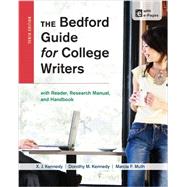PACKAGE THIS TITLE WITH OUR 2016 MLA SUPPLEMENT, Documenting Sources in MLA Style (package ISBN-13: 9781319086824). Get the most recent updates on MLA citation in a convenient, 40-page resource based on The MLA Handbook, 8th Edition, with plenty of models. Browse our catalog or contact your representative for a full listing of updated titles and packages, or to request a custom ISBN.
Both reliable and innovative, The Bedford Guide for College Writers involves students in active learning, whether their writing class meets on campus or online. The guide contains a process-oriented rhetoric, a thematic reader, a research manual, and a handbook, giving students everything they need for success in writing, all in one affordable book. Each part provides frequent opportunities for students to experiment and apply the skills presented. Learning by Doing activities, Responding to an Image practices, and engaging assignments all help students make important writing skills their own. The Bedford Guide helps students to be the confident, resourceful, and independent writers they will need to be. The new edition extends active learning into the online environment, offering integrated e-Pages, including videos, audio segments, and photo essays that take advantage of what the Web can do. See what's in the LaunchPad





